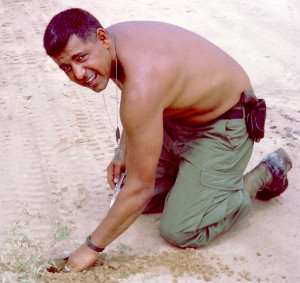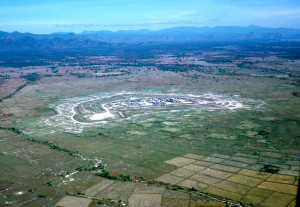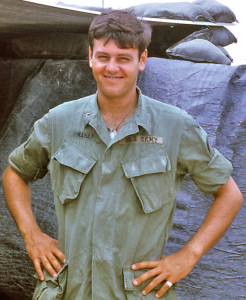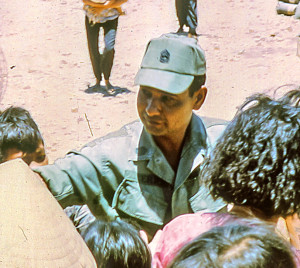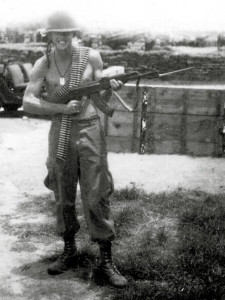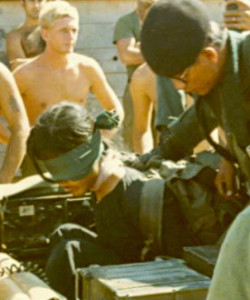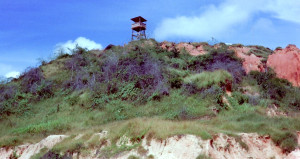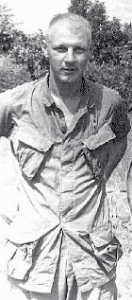Hank Parker
PART SEVEN
Richard Durant – First Sergeant
(highest ranking sergeant in the battery)
Pretty soon a new first sergeant comes in, Richard Durant. He’s an older guy, maybe 35, who came into the Army from the Air Force. Early on he says to me, “Lieutenant, come on over to my hooch.” He’s got a six pack of Pabst Blue Ribbon, so already I know I like him. And he’s got ice! Where in the world did he get ice?
He says “Let’s have a talk.” He’s asking me all kinds of questions about the strengths of the battery, the weaknesses, what do you need, how things work at Sherry, what can I do for you as First Sergeant, what’s going on with personnel. He says, “It seems like the guys are kind of down.”
I say, “Yeah, it’s been tough out here.”
“Let’s have a couple beers and we’re going to discuss it. We pop two beers and he pulls out this field manual on land mine detecting. He has a mine detector there in his hooch and we fool around with it a little. When the six pack is dead he says, “Let’s go bury these cans.”
I say, “We don’t have to bury the cans, Top, we can just throw them in the trash.”
“No, no. We’re going to bury these cans.” Then it dawns on me what he’s up to. So we bury the cans and go back to his hooch for a few more beers. Then he says, “OK, let’s go find those cans.” In that way we learned how to operate the mine detector, reading the manual for proper procedure and practicing with it.
The next morning bright and early he grabs me and says, “Hey, XO, let’s go.”
I say, “Go where?”
“We’re gonna clear the road.”
“What? I’m not clearing no road.”
He says, “Hey, we learned how to operate this mine detector. Let’s show the men we know how to use it.”
“Are you nuts?”
He says, “Lieutenant, you got to lead. You don’t tell men what to do, you show ‘em. You teach ‘em.”
“OK, Top.”
Typically South Vietnamese soldiers clear the road, and then we clear it again because we do not trust them. I have to be honest, before that evening I knew nothing about mine sweeping equipment or how it worked. Now I do. So we get out there and I do not expect to find a mine or a booby trap, but we do. It is a 105 mm howitzer shell in the road. I cannot believe it. We have another lieutenant with us, a new guy. He immediately gets a knife and he’s going to probe. Durant pushes him back and says, “No lieutenant, let’s do it this way.”
Durant acts like he’s done this a million times. It’s his first time but you wouldn’t know it. Durant takes the knife and probes around and checks for any wires to make sure it’s not command detonated. I had just gotten a new Yashica 35 mm camera and I snap a picture of him digging around the land mine. He looks up at me and says, “Lieutenant, what in the hell are you doing?”
I say, “I’m taking pictures, Top. This is cool.”
He gets the mine exposed, wraps detonation cord around it, inserts a blasting cap, and then blows it. I’ve got pictures of the whole process. We immediately contact the battery, because when you see a puff of smoke you think, Oh no, we just lost another couple guys.
Gulley and Sherlock died on the road right before Durant got to Sherry. He is going to make damn certain that does not happen again. That’s why he straight off gets onto straightening out our mine sweeping.
When we get back to the battery he says, “Well it’s time to go on convoy.”
I say, “What do you mean time to go on convoy? I’m not going on convoy.”
He says, “XO, XO, come on. Didn’t I tell you we’ve got to lead these guys?”
“OK, but I’m not going out in a jeep. If you want me to lead the convoy I’m getting the biggest truck we got in the battery and we’re sandbagging it and I’ll go.” I get a five-ton truck. We put the windshield down and I pile up sandbags on the seat so that I’m sitting on a mountain of sandbags. And we go to Betty for our supplies.
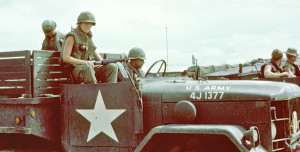
From that time on I am always in the lead vehicle on convoys, usually with Durant beside me. I’m in a jeep now, confident that the road is safe because I’ve swept the road myself. The second vehicle is one of our Quad-50s right behind me (four 50 caliber machine guns mounted on the back of a five ton truck). When you’ve got the Quads with you on convoy the Viet Cong are not going to mess with you.
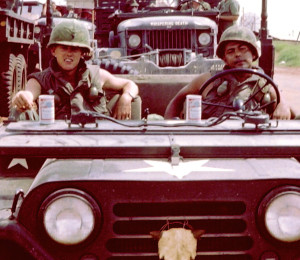
Followed by Whispering Death
In every little thing Durant brings a new approach. He stresses the importance of keeping food out of our hooches and keeping the grass down on the perimeter, because of hygiene and rats. He doesn’t just rely on his sergeants to know the guns or do the aiming circle (a survey instrument used to orient the howitzers. At Sherry it is mounted on a small tower). He gets up on the aiming circle himself. He sees to it that assignments are fair, that the rotation is uniform. It’s not that he lacks discipline. We still search hooches, and if orders come down to do something we do it, but he does not make it offensive. He tells the men why we are doing something, the purpose and the reason, and explains why it’s a good reason. He does not do things just to be doing them. At night when we do guard duty, he takes his own guard rotation, and so do all of his senior sergeants. When we go into Betty to get ammo, he helps load ammo and unload ammo. That’s unusual for a first sergeant, and he expects his other sergeants to do the same.
The air around the battery changes almost instantaneously. The guys know that here are people who are interested in us. They are not just telling us what to do, they’re showing us.
We get a call from battalion in Phan Rang telling us a kid had thrown a grenade at one of the
First Sergeants and they are sending him out to Sherry. Apparently we are considered the unit that knows how to deal with the tough guys. Durant gets me and Chief of Smoke Cerda (senior sergeant in charge of the howitzers) and says, “We got a new guy coming to the battery and he’s got some difficulties.”
I say, “What do you mean, difficulties?”
“Well, he threw a fragmentation grenade at a First Sergeant. It didn’t go off and they decided they better send him out here to us.”
I say, “What? That’s more than a difficulty.”
He says, “No, we can deal with it. When he comes out here I‘ll have him brought here to the hooch and we’ll introduce him to you and myself and to Cerda.” So they bring him in from the helicopter pad to the command hooch. Andy Kach, our ammo section chief, brings him in and says, “Here’s Frag.”
We don’t even know his real name, and he says right off, “I’m not going to do that here.”
Durant says, “You got that right, boy!”
Frag says, “I didn’t like all the grief in the rear, painting rocks and stuff.”
Durant says, “Here’s how it works. If you have any problems or disagreements you just come and tell one of us. You don’t throw grenades; that’s not an appropriate way to settle a dispute. However, if you feel like you need to throw a grenade, you better make sure we’re all three together and you get all three of us, because otherwise you’re going to die.”
He turns out to be a really good trooper. And he never loses the nickname Frag.
Mama-San Medevac
Mama-san is giving birth, and she’s just huge. This is a Caucasian baby and the baby is too big. There’s blood everywhere. The doc thinks she not gonna make it; she’s gonna die.
He says, “What are we gonna go?”
I say, “We’ve got to get her to a hospital. I’ll call a Medevac.”
I do and they say, “What’s the situation?” I tell them and they say they’re not going to come.
I say, “You get out here.” I have an inkling of who the father is and say, “We’re responsible for this woman and this baby. She’s gonna die if I don’t get her to a hospital.”
I get the Medevac and we get her to the hospital. The next day I go to Phan Thiet to see her. By then she is in a Vietnamese facility and it is deplorable. There are pallets on the floor in a building that is almost collapsing, with sewer water and flies. But she’s happy with a bouncing healthy baby.
Of course Mama-san comes back out to the battery. We have no idea what happened to the baby, but the assumption is that family in Phan Thiet is taking care of the baby.
From that point on she knows that I will take care of her and her girls. And they take care of me. The little girl Cindy would get me coffee in the morning, clean my hooch. Of course everybody thinks Cindy is my squeeze, but no way.
You see my picture of Mama-san and the other Vietnamese. You don’t just take pictures. They run and get into their best clothing, because this is special for them. The one color picture they’re going to have for the rest of their lives.
Part of our role in Vietnam is to win hearts and minds. If you let someone die on your firebase you’re not going to win many hearts and minds. When you get down to the brass tacks of what we were doing, if a person in combat can say, I did the right thing, even if the consequences are negative, you can live with yourself. I know it’s the right thing to do, and that if I didn’t do it, make an attempt to do it, I would have difficulty living with myself.
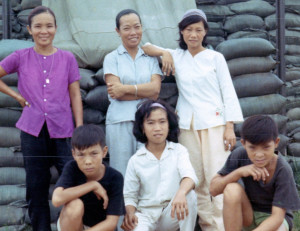
Cindy front row center
